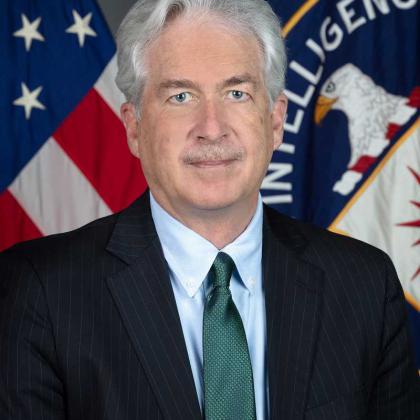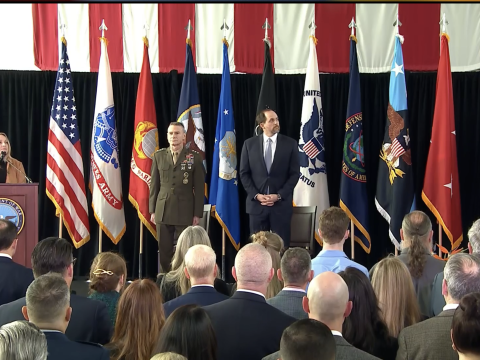Strategic Intel Sharing Aids Support of Ukraine
Efforts by the Central Intelligence Agency to selectively share key intelligence about Russia with allies and partners has helped to support Ukraine. The move to share additional information by declassifying it—in more of an unusual manner—helped strengthen against Russia’s unprovoked war on Ukraine, the agency’s director, William Burns, reported on September 8, speaking at the annual Billington CyberSecurity conference in Washington, D.C.
“Decisions to declassify intelligence are always very complicated,” Burns said. “When President Biden has decided very carefully and very selectively to make public some of our secrets, it's played a very effective role over the course of the last six months. And I think it can continue to again, if we make it the exception, not the rule.”
Opening certain pieces of secret information unveiled Putin’s true intentions and countered his falsities, the director continued.
“In this instance, I think it's been a very important means of denying Putin, something that I've watched him employ too often in the past, [from] creating false narratives, trying to blame the Ukrainians, to create false provocations in the run-up to the war. And I think what we were able to do working with our allies and partners is to expose the fact that Putin’s war is an unprovoked aggression. And I think that very selective, very careful declassification has played an effective role.”
The CIA director sees strategic declassification as a tool the agency and United States can expeditiously continue to use—especially in cyber defense.
“Again, I think we're going to have to be careful looking at other instances, whether it's in terms of cyber threats or other kinds of challenges that the United States and our allies will face in the future,” he shared. “If used carefully and selectively, I think this technique, this tool of declassifying some of our secrets, in a way that serves a broader strategy, can pay big benefits.”
The intelligence must be accurate, of course, so that leaders across many countries can make effective decisions, Burns stated. And that successful generation of intel does help to bring allies and partners closer together.
“And I think you can see the benefit of very systematic intelligence sharing in support of the Ukrainian’s ability to defend themselves. We see this right through to this day,” the CIA leader offered. “Sharing intelligence, and doing that methodically, quickly with our partners, is already a really important tool or instrument of American national security policy. Declassifying intelligence, parts of it, and making it public is a different kind of tool. But as I said before, I think that can also be effective in some circumstances.”
Burns, who served previously as the U.S. ambassador to Moscow and has closely watched Russia’s leader over the years, warned that Putin’s appetite for risky actions was growing, especially given the absence of differing opinions in his narrow power circle.
“If you take a step back from last fall, we in the U.S. intelligence community began to develop a pretty clear picture of Russian planning for a major invasion of Ukraine. What was striking to us and to me about that is not just the scale of planning but also what it said about Putin’s increasingly deep fixation with controlling Ukraine,” the CIA director said. “I have watched, especially over the last decade, as Putin tightened his grip on power and as he narrowed his circle of advisers and is increasingly surrounded by [those] who either share his views of the world about Ukraine or have learned over the years that it's not career-enhancing to challenge his assumptions. What you could also see quite clearly is Putin’s sense of destiny and his appetite for risk increasingly growing.”

If used carefully and selectively, I think this technique, this tool of declassifying some of our secrets, in a way that serves a broader strategy, can pay big benefits.
Putin’s distorted views may very well be his weakness. The Russian leader continues to misjudge the country he invaded as well as Ukraine’s allies, the CIA director said.
“Putin’s bet, I think, is that he has to be tougher than the Ukrainians, the Europeans and the Americans,” Burns stated. “That he can wear down Ukraine and strangle their economy, that the Europeans will be facing a difficult winter with high energy prices, and [they] are going to lose resolve. He thinks America has attention deficit disorder and we will get distracted. And I think Putin is as wrong at that bet as he was so profoundly wrong about his presumptions.
"And while the final chapter about Putin’s war in Ukraine has not been written, I think intelligence will continue to play an enormous role in supporting Ukraine …. and ensure that Putin fails in Ukraine. It’s hard to see Putin’s record so far as anything other than a failure so far. Not only has the weakness of the Russian military been exposed, and there's going to be long-term damage to the Russian economy and to generations of Russians as a result of this. He faces two new members of NATO: Finland and Sweden.”


Comments